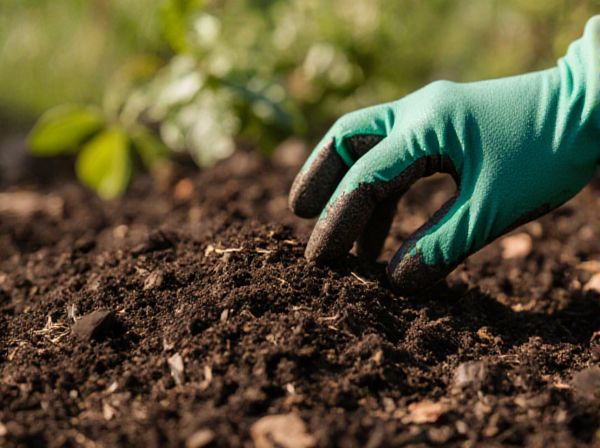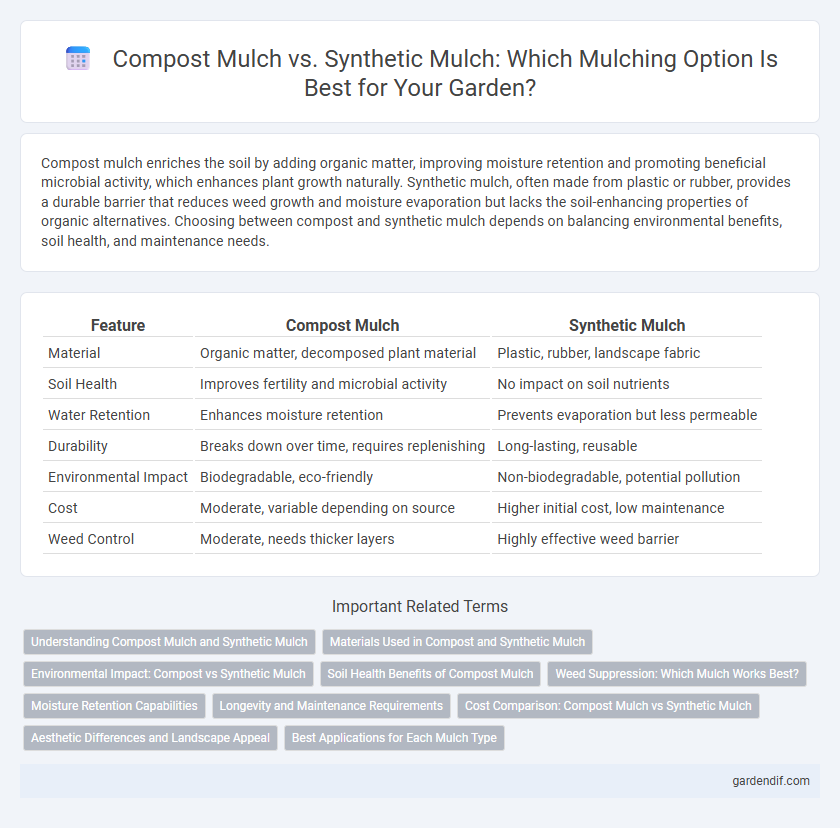
Compost mulch vs synthetic mulch Illustration
Compost mulch enriches the soil by adding organic matter, improving moisture retention and promoting beneficial microbial activity, which enhances plant growth naturally. Synthetic mulch, often made from plastic or rubber, provides a durable barrier that reduces weed growth and moisture evaporation but lacks the soil-enhancing properties of organic alternatives. Choosing between compost and synthetic mulch depends on balancing environmental benefits, soil health, and maintenance needs.
Table of Comparison
| Feature | Compost Mulch | Synthetic Mulch |
|---|---|---|
| Material | Organic matter, decomposed plant material | Plastic, rubber, landscape fabric |
| Soil Health | Improves fertility and microbial activity | No impact on soil nutrients |
| Water Retention | Enhances moisture retention | Prevents evaporation but less permeable |
| Durability | Breaks down over time, requires replenishing | Long-lasting, reusable |
| Environmental Impact | Biodegradable, eco-friendly | Non-biodegradable, potential pollution |
| Cost | Moderate, variable depending on source | Higher initial cost, low maintenance |
| Weed Control | Moderate, needs thicker layers | Highly effective weed barrier |
Understanding Compost Mulch and Synthetic Mulch
Compost mulch is an organic material made from decomposed plant matter that enhances soil fertility and moisture retention while promoting beneficial microbial activity. Synthetic mulch, typically composed of plastic or rubber, provides long-lasting weed suppression and moisture control but lacks nutrient contribution to the soil. Understanding the differences in environmental impact, biodegradability, and soil health benefits is crucial when choosing between compost mulch and synthetic mulch for landscape management.
Materials Used in Compost and Synthetic Mulch
Compost mulch consists primarily of decomposed organic materials such as food scraps, yard waste, leaves, and grass clippings, enriching soil fertility while enhancing moisture retention. Synthetic mulch is made from non-biodegradable materials like plastic, rubber, or landscape fabric, designed for weed suppression and durability. Organic compost mulch decomposes over time, contributing nutrients to the soil, whereas synthetic mulch provides a long-lasting physical barrier without nutrient input.
Environmental Impact: Compost vs Synthetic Mulch
Compost mulch enriches soil health by adding organic matter and promoting microbial activity, which enhances nutrient cycling and reduces landfill waste. Synthetic mulch, typically made from plastics, can contribute to soil contamination, hinder water infiltration, and generate microplastic pollution when degraded. Choosing compost mulch supports sustainable agriculture and reduces environmental footprint compared to synthetic alternatives.
Soil Health Benefits of Compost Mulch
Compost mulch enhances soil health by improving microbial activity and increasing nutrient availability, promoting robust plant growth. Unlike synthetic mulch, compost breaks down naturally, enriching soil organic matter and boosting water retention. The decomposition process also supports beneficial fungi and bacteria, leading to healthier, more resilient soil ecosystems.
Weed Suppression: Which Mulch Works Best?
Compost mulch effectively suppresses weeds by nourishing soil microbes and creating a dense organic layer that inhibits weed seed germination. Synthetic mulch, such as plastic or landscape fabric, offers superior weed suppression by blocking sunlight and physically preventing weed growth. For long-term soil health and moderate weed control, compost mulch is ideal, while synthetic mulch excels in immediate and aggressive weed suppression.
Moisture Retention Capabilities
Compost mulch excels in moisture retention by improving soil structure and increasing water-holding capacity due to its organic matter content. Synthetic mulch, often made from plastic or rubber, prevents evaporation by creating a physical barrier but does not enhance soil moisture retention over time. The porous nature of compost mulch allows gradual water infiltration, promoting healthier plant growth compared to non-porous synthetic materials.
Longevity and Maintenance Requirements
Compost mulch, made from organic materials, decomposes over time, enriching soil but requiring regular replenishment every few months to maintain effectiveness. Synthetic mulch, often crafted from plastic or rubber, offers superior longevity lasting several years without significant breakdown, reducing the frequency of replacement. Maintenance for compost mulch involves monitoring moisture and reapplying nutrients, while synthetic mulch demands minimal upkeep but may necessitate removal or disposal for environmental concerns.
Cost Comparison: Compost Mulch vs Synthetic Mulch
Compost mulch generally costs less upfront than synthetic mulch, typically priced at $20 to $40 per cubic yard compared to $30 to $50 for synthetic options like rubber or plastic. While synthetic mulch offers longer durability, compost mulch enhances soil fertility and reduces the need for additional fertilizers, potentially lowering long-term gardening expenses. Considering both initial investment and ongoing benefits, compost mulch often provides a more cost-effective and sustainable solution for garden bed management.
Aesthetic Differences and Landscape Appeal
Compost mulch offers a natural, earthy appearance that enhances garden beds with rich brown tones and organic texture, promoting a seamless integration with surrounding plants. Synthetic mulch, often available in vibrant colors like red, black, or rubberized hues, delivers a uniform and polished look but can appear less natural and may fade over time. The choice between compost and synthetic mulch significantly impacts landscape appeal by balancing natural aesthetics against consistency and color permanence.
Best Applications for Each Mulch Type
Compost mulch excels in enhancing soil fertility and moisture retention, making it ideal for vegetable gardens, flower beds, and organic farming. Synthetic mulch, such as plastic or rubber, provides superior weed suppression and temperature control, suited for commercial crop production and landscaping in drought-prone areas. Choosing the best mulch depends on site-specific needs, including soil health improvement or long-term weed management.
Compost mulch vs synthetic mulch Infographic

 gardendif.com
gardendif.com